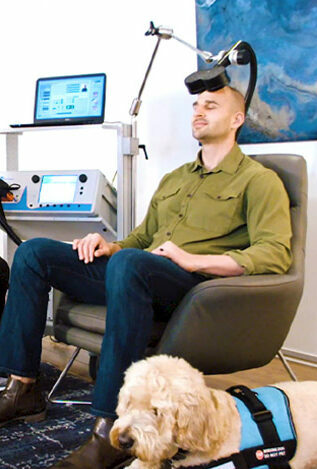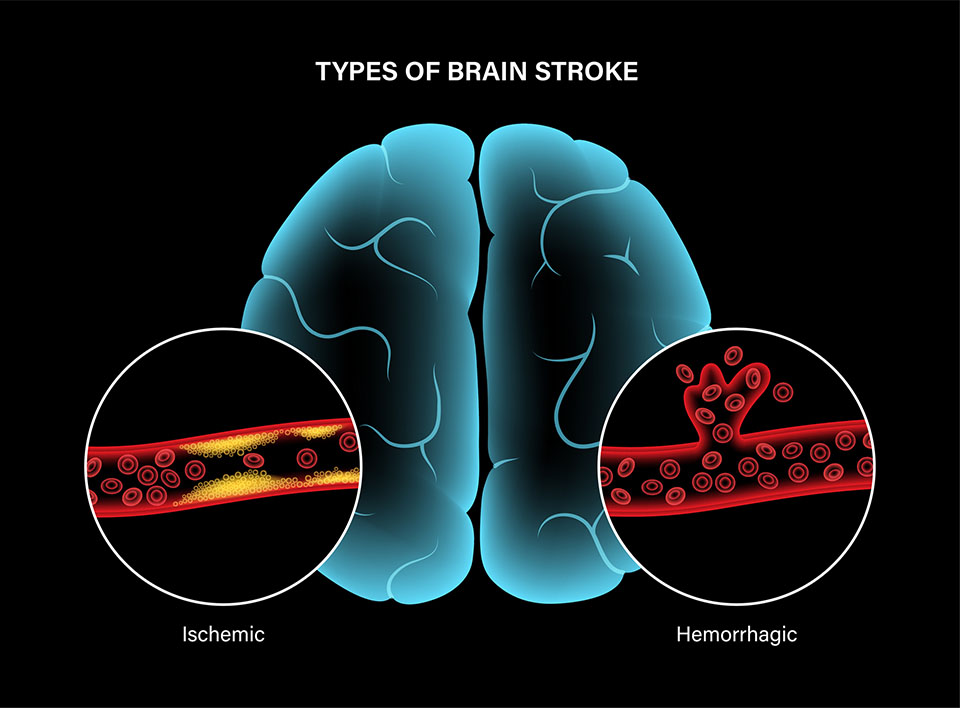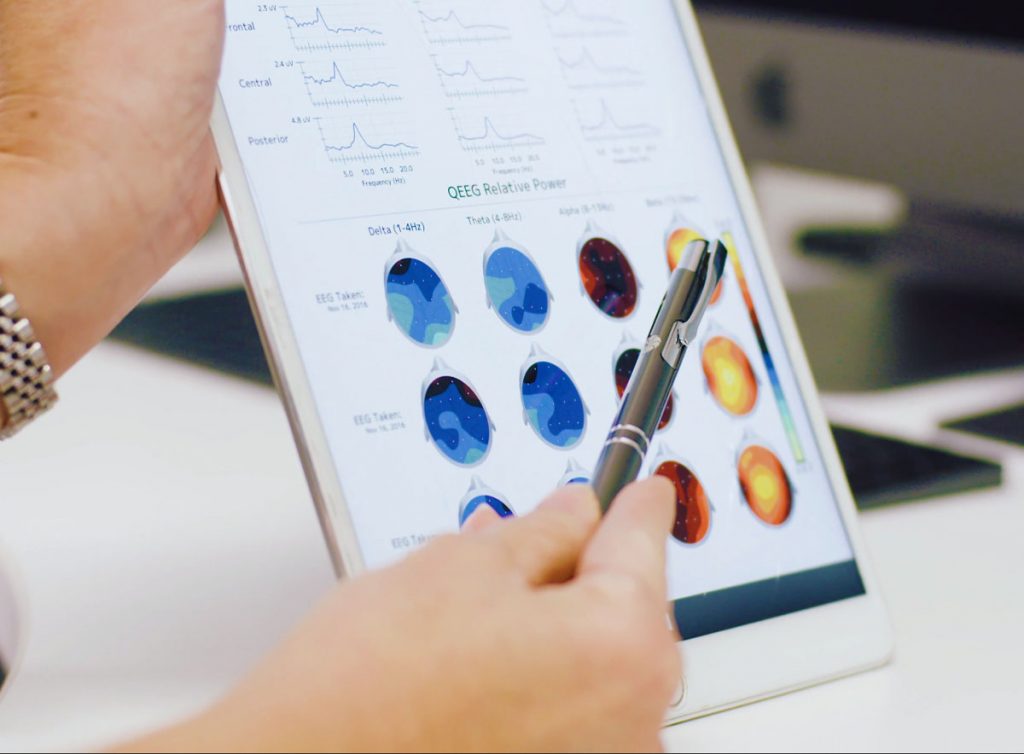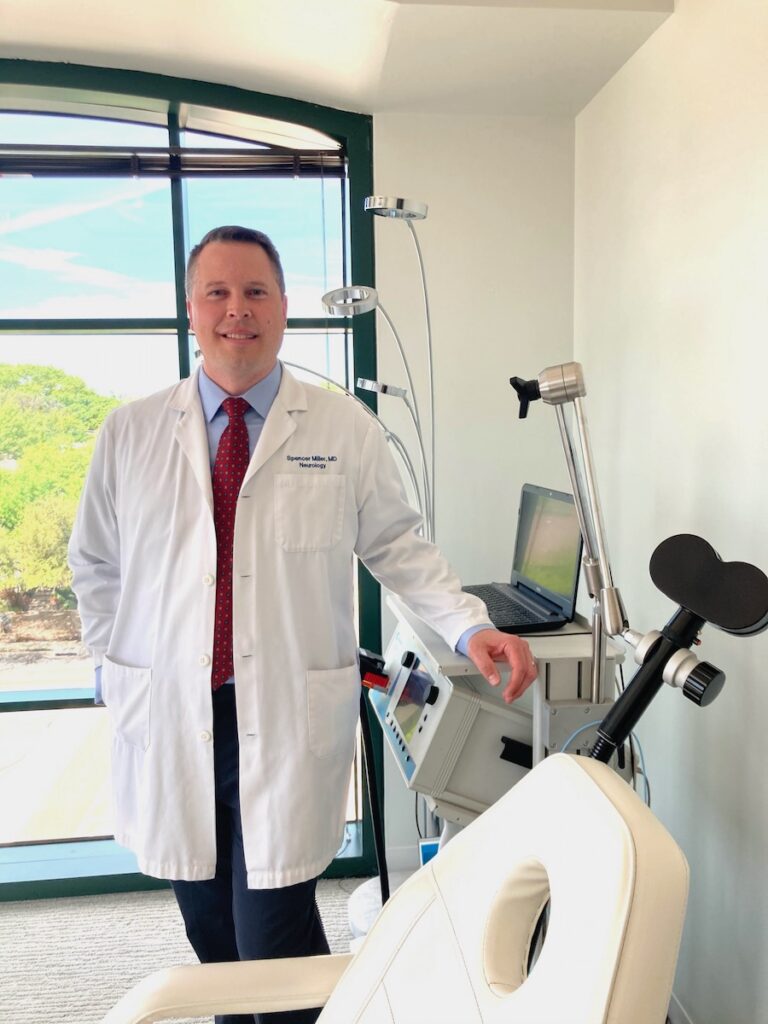
Struggling with Stroke Recovery? Discover the Power of MeRT
MeRT stands for Magnetic e-Resonance Therapy.
We use a gentle magnetic field, guided by sophisticated brain mapping, to balance and stimulate brain function.
MeRT can dramatically reduce the after-effects of stroke, including:
- Memory loss
- Fatigue
- Speech difficulties
- Depression and anxiety
MeRT Can Help You Recover Faster From the After-effects of Stroke
Stroke recovery can be challenging and frustrating. It’s not only the physical challenges; it’s also the mental and emotional after-effects that can come from a stroke. We understand how important it is to support your brain’s healing process, and we’re here to help.
Neurologist Dr. Spencer Miller has brought MeRT®, or Magnetic e-Resonance Therapy, to Plano, Texas. This non-invasive, drug-free treatment focuses on optimizing brainwave activity. And that improved brain activity can directly affect how well you recover after a stroke. Plus, MeRT can be used alongside or after other recovery therapies.
If you are dealing with memory loss, cognitive issues, depression, or other stroke after-effects, contact us to learn more about MeRT treatment.

Contact our
New Patient Coordinator
Or fill in the form at the bottom of the page for more information.

How MeRT Can Help With Stroke Recovery
Here at the Brain Treatment Center Plano, we offer a highly customized rTMS treatment for stroke recovery called MeRT. MeRT stands for Magnetic E (for EEG and EKG) Resonance Therapy.
MeRT combines technologies of repetitive Transcranial Magnetic Stimulation (rTMS), Quantitative Electroencephalogram (qEEG), and Electrocardiogram (ECG/EKG) to analyze the brain and formulate treatments tailored for your unique brain pattern.
The TMS equipment used is FDA-cleared to treat Major Depressive Disorder and OCD and is used off-label to treat a wide variety of conditions, including Stroke Recovery.
How effective is MeRT? A 2022 study found the following:
This study was conducted to determine the possibility of inducing cognitive recovery by using rTMS treatment for patients with PSCI [Post Stroke Cognitive Impairment] that persisted for more than 6 months, despite intensive rehabilitation treatment for cognition. The results indicated a cognition-enhancing effect in the patients via increments in the IQ, AVLT, CFT, and MQ scores just after 2 weeks of rTMS completion. After 3 months, the increments in the AVLT, CFT, and MQ scores were sustained, and the IQ was increased with marginal significance. Moreover, the MMSE and MoCA scores, which did not show changes 2 weeks after the rTMS, were also increased at this time.”
Understanding Stroke and Its Effects on the Body
Strokes can have a profound impact on the body, and understanding the different types is crucial for effective recovery. Below, we break down the three main types of strokes and how they affect various body functions.
Ischemic Stroke
Cause: An ischemic stroke occurs when a blood clot blocks or narrows an artery leading to the brain, accounting for about 87% of all strokes.
Effects on the Body: The blockage prevents blood and oxygen from reaching parts of the brain, causing brain cells to die within minutes. Symptoms include:
- Sudden numbness or weakness, especially on one side of the body
- Confusion and trouble speaking or understanding speech
- Difficulty seeing in one or both eyes
- Trouble walking, dizziness, and loss of balance or coordination
Hemorrhagic Stroke
Cause: A hemorrhagic stroke happens when a blood vessel in the brain bursts, leading to bleeding in or around the brain. Causes include high blood pressure, aneurysms, or arteriovenous malformations (AVMs).
Effects on the Body: The bleeding increases pressure in the skull, damaging brain cells and tissues. Symptoms often include:
- Sudden, severe headache
- Nausea, vomiting, and a stiff neck
- Sensitivity to light, confusion, and loss of consciousness
- Neurological deficits such as weakness or paralysis on one side of the body, difficulty speaking, or vision problems

Transient Ischemic Attack (TIA)
Cause: Also known as a “mini-stroke,” a TIA is caused by a temporary blockage of blood flow to the brain. The blockage is brief, and there is no permanent damage.
Effects on the Body: Symptoms are similar to a full-blown stroke but are temporary, typically lasting less than an hour. They include:
- Trouble walking, dizziness, or loss of balance or coordination
- Sudden numbness or weakness, especially on one side of the body
- Confusion and trouble speaking or understanding speech
- Difficulty seeing in one or both eyes
Stroke recovery involves prompt medical treatment, rehabilitation, and support to manage long-term effects. Each person’s journey is unique, and a tailored approach to rehabilitation, including MeRT treatment, can significantly improve outcomes.

Is MeRT the Right Treatment for You?
We understand that MeRT is a relatively new treatment, and you may not be certain if this is right for you. But this is not a decision you need to make right away or all alone. Start with a simple phone consultation with our New Patient Coordinator. Here, you can discuss your symptoms and history, ask all the questions you want, and have her explain the protocols, fees, and details of treatment.
Step 1
Testing and Consultation
If you are interested in taking the next step in seeing if MeRT treatment is right for you, we can set up an appointment for an EEG (brain scan) and a second appointment for a consultation with the doctor to talk about your symptoms and the results of your EEG. Each of these appointments is about 45 minutes to an hour.
At the first appointment, our neurotechnician will perform an EEG and an EKG. Both are simple, painless, and non-invasive tests to see exactly what is happening in your brain.
A few days later, when your test results are in and analyzed, you will have a one-on-one consultation with the doctor. You can attend this appointment virtually from the comfort of your home. Here, you will discuss your test results, get answers to any additional questions you may have, and together determine if you (or your child, if this is about your child) are a candidate for treatment.
Step 2
The Assessment Period
If you and the doctor then decide to move forward with MeRT, the next step is what we call the Assessment Period. Here, we will perform a short period of several days of treatment, followed by a new EEG to see if you are responding to the treatment. We assess this based on the new EEG results as compared to the initial one done before treatment started, as well as symptom improvements.
Step 3
Continued Treatment
If there is a positive response to treatment during the assessment period, you will have likely noticed some improvements starting to take place. At that point, we can schedule the additional treatment duration. We perform treatments daily, Monday to Friday, in two-week increments. A typical treatment session takes about 45 minutes.
You will sit in a chair while the neurotechnician administers the treatment via a hand-held magnet that is held near the scalp. We deliver the magnetic impulses for 6 to 8 seconds each minute. You may feel a slight sensation while the treatment is occurring, but it is not painful or uncomfortable. We use no medications, and you are fully awake throughout.
MeRT treatments will usually go for anywhere from 4 to 8 weeks. In some cases, we recommend additional treatment time to get the best results from MeRT. Each individual is unique, and protocols may vary. Plus, your provider will have regularly scheduled follow-up EEGs and meet with you to closely manage your progress.
Why Choose Brain Treatment Center Plano for Your Stroke Recovery?
Our center prides itself on its expertise, state-of-the-art facilities, and a dedicated medical team that genuinely cares. We believe in a personalized approach, ensuring each patient receives tailored treatment to address their unique needs.
Our Medical Director, Dr. Spencer Miller, is a board-certified neurologist who has been practicing for 12 years.
Dr. Miller specializes in MeRT treatment of traumatic brain injury, depression, anxiety, post-traumatic stress disorder, dementia, autism, and multiple other brain disorders.
He also works with Baylor University Medical Center, where he specializes in stroke, headache medicine, traumatic brain injury, post-traumatic stress disorder, and seizure. Additionally, he is associated with the Texas A&M Science Center College of Medicine.


Contact Our New Patient Coordinator for More Information
Our New Patient Coordinator is here for you. During your free consultation, she will take the time to answer any questions that you may have, listen to your concerns, and carefully explain all the details and information you need.
If, after talking to her, you are interested in further exploring whether you could benefit from MeRT for Stroke Recovery, the next step would be to schedule your EEG and a consultation with our doctor.
With thorough diagnostics, the doctor can show you what is happening in your brain and what may be causing the issues you are experiencing. At this point, we can determine whether you may benefit from MeRT treatment, and you can decide if you would like to move forward.
Life Can Be Better
With so many successful treatments, we encourage you to explore the possibilities of MeRT. If right for you, it can have a lasting impact — and you can enjoy a greatly improved quality of life!
Or fill in the form below, and we will contact you.
Contact Form

Insurance Coverage and Payment Options
Currently, rTMS is only FDA-cleared for the treatment of depression. However, we can provide you with all the appropriate paperwork at the end of your treatment so that you can submit it to your insurance company for possible reimbursement.
Some patients have reported that they have been able to receive some reimbursement for EEGs, clinical evaluations, and treatment, depending on their health coverage. Medicare patients have reported that their coverage provides no reimbursement for the treatment itself.
We accept all major credit cards, including Visa, MasterCard, American Express, and Discover.
